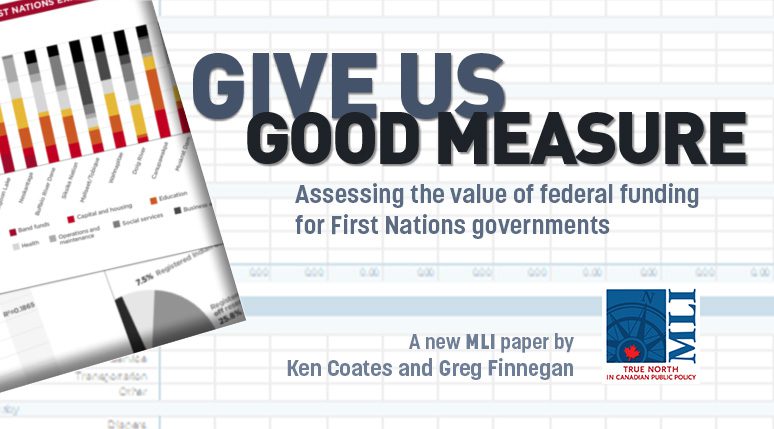OTTAWA, ON (October 26, 2022): Without a fixed formula from Ottawa, funding First Nations governments is never simple. And with each community managing its own unique problems, strengths, and needs, we need to ask what the right approach is going forward.
In this paper, titled Give us good measure: Assessing the value of federal funding for First Nations government, authors Ken Coates and Gregory Finnegan argue for a new approach that better recognizes the varying circumstances facing individual First Nations. The authors examine the finances of a sample of 12 First Nations from across Canada, using them to describe the inequality in First Nation government financing.
The authors find that, all too often, governments rely on stop-gap measures to address funding inequality between First Nations governments. Such measures do little to resolve the longstanding gaps.
“With few exceptions, these First Nations are struggling to provide adequate public goods and services for their members who suffer from low educational attainment, household dependency on government transfers, population displacement, and high unemployment rates,” write Coates and Finnegan.
Yet the authors also conclude that there is no predictable formula that can outline the appropriate level of First Nations government funding. With so much variability, a universal solution is very difficult.
“The communities with the highest annual expenditures could be the ones with the greatest entrepreneurial activity, the heaviest demand on social services, the most advanced self-government arrangements, [or] the greatest draw-down of federal and provincial responsibilities,” write Coates and Finnegan. “A community with a large budget could be running large deficits while a low-income but well-managed First Nation could have a significant surplus.”
Ottawa should instead consider the substantial variation in current arrangements and the subsequent inequality in services, programs and quality of life among First Nations across the country. As the authors argue, Ottawa needs to seek funding arrangements that raise up communities to eventually match nearby or “standard” Canadian communities when it comes to basic elements like services and infrastructure.
Other measures that could be enacted include:
- expanding existing block pilot projects;
- adopting a longer time horizon for First Nations funding;
- moving to comprehensive funding packages that privilege First Nations decision-making;
- investing in Indigenous governance and administrative capacity; and
- supporting Indigenous controlled oversight arrangements.
Yet First Nations must themselves accept and support transparent governments, even as they invest in their community and regional administrative capacity and continue to pursue their own-source revenues.
“First Nation audits should not be seen as a Crown-imposed duty, but as a duty of First Nation governments and administration to their members,” write Coates and Finnegan. Audited financial statements give confidence to members about how the First Nation’s money was spent and are “an essential condition for First Nations well-being.
“The government of Canada needs to take systematic steps to transfer financial resources and decision-making authority to First Nations. With autonomy and stable financing, First Nations will finally have the opportunity to set their communities on a course of their choosing.
“And this, after all, is all the Indigenous peoples really ask of Canada.”
To learn more, read the full paper here:
***
Ken Coates is a Distinguished Fellow at the Macdonald-Laurier Institute, and the Canada Research Chair in Regional Innovation at the University of Saskatchewan.
Gregory Finnegan was appointed to manage Policy North, an applied research group associated with the Johnson Shoyama Graduate School of Public Policy at the University of Saskatchewan in January 2020. He holds a doctorate in geography from York university with a specialization in regional economic development.
For further information, media are invited to contact:
Skander Belouizdad
Communications Officer
613-482-8327 x111
skander.belouizdad@macdonaldlaurier.ca







